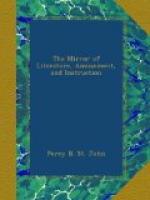as a charger, by an adjutant to an English regiment.
She was even fond of music—and delighted
to prance behind the band—unterrified by
cymbals or great drum. She never moved in a roar
of artillery at reviews—and, had the Castle
of Edinburgh—Lord bless it—been
self-involved, at that moment, in a storm of thunder
and lightning, round its entire circle of cannon, that
mare would not so much as have pricked up her ears,
whisked her tail, or lifted a hoof. But the pibroch
was more than horse-flesh and blood could endure—and
off we two went like a whirlwind. Where we went—that
is to say, what were the names of the few first streets
along which we were borne, is a question which, as
a man of veracity, we must positively decline answering.
For some short space of time, lines of houses reeled
by without a single face at the windows—and
these, we have since conjectured, might be North and
South Hanover street, and Queen-street. By and
by we surely were in something like a square—could
it be Charlotte-square?—and round and round
it we flew—three, four, five, or six times,
as horsemen do at the Caledonian amphitheatre—for
the animal had got blind with terror, and kept viciously
reasoning in a circle. What a show of faces at
all the windows then! A shriek still accompanied
us as we clattered, and thundered, and lightened along;
and, unless our ears lied, there were occasional fits
of stifled laughter, and once or twice a guffaw; for
there was now a ringing of lost stirrups—and
much holding of the mane. One complete round
was executed by us, first on the shoulder beyond the
pommel; secondly, on the neck; thirdly, between the
ears; fourthly, between the forelegs, in a place called
the counter, with our arms round the jugular veins
of the flying phenomenon, and our toes in the air.
That was, indeed, the crisis of our fever, but we
made a wonderful recovery back into the saddle—righting
like a boat capsized in a sudden squall at sea—and
once more, with accelerated speed, away past the pillared
front of St. George’s church!
The castle and all its rocks, in peristrephic panorama,
then floated cloud-like by—and we saw the
whole mile-length of Prince’s-street stretched
before us, studded with innumerable coaches, chaises,
chariots, carts, wagons, drays, gigs, shandrydans,
and wheel-barrows, through among which we dashed,
as if they had been as much gingerbread—while
men on horseback were seen flinging themselves off,
and drivers dismounting in all directions, making their
escape up flights of steps and common stairs—mothers
or nurses with broods of young children flying hither
and thither in distraction, or standing on the very
crown of the causeway, wringing their hands in despair.
The wheel-barrows were easily disposed of—nor
was there much greater difficulty with the gigs and
shandrydans. But the hackney-coaches stood confoundedly
in the way—and a wagon, drawn by four horses,
and heaped up to the very sky with beer-barrels, like




